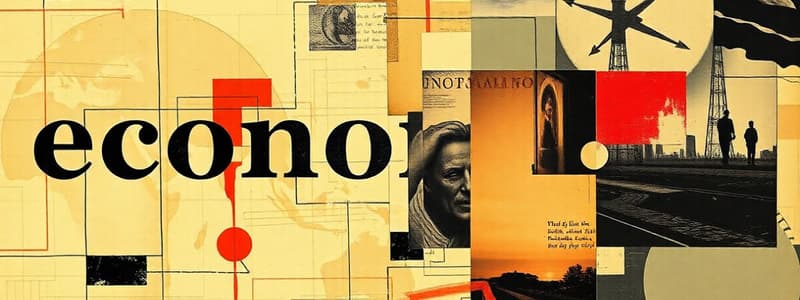Podcast
Questions and Answers
What does the term 'Oikonomia' refer to in the context of economics?
What does the term 'Oikonomia' refer to in the context of economics?
- Distribution of resources
- Management of the household (correct)
- Wealth management
- Production methods
Who is regarded as the 'Father of Economics'?
Who is regarded as the 'Father of Economics'?
- Paul Samuelson
- Lionel Robbins
- Alfred Marshall
- Adam Smith (correct)
What is the primary focus of microeconomics?
What is the primary focus of microeconomics?
- National income
- Global trade
- Household and individual behavior (correct)
- Government interventions
According to Adam Smith, what is a key characteristic of his definition of economics?
According to Adam Smith, what is a key characteristic of his definition of economics?
What does Alfred Marshall's definition of economics emphasize?
What does Alfred Marshall's definition of economics emphasize?
In Lionel Robbins' definition, how are wants characterized?
In Lionel Robbins' definition, how are wants characterized?
What does 'Arthashastra' imply according to Kautilya?
What does 'Arthashastra' imply according to Kautilya?
Which of the following is NOT a key point in Robbins' definition of economics?
Which of the following is NOT a key point in Robbins' definition of economics?
The term 'Oikonomia' is derived from the ______ word.
The term 'Oikonomia' is derived from the ______ word.
According to Paul Samuelson, economics is referred to as the 'Queen of ______ Sciences'.
According to Paul Samuelson, economics is referred to as the 'Queen of ______ Sciences'.
Adam Smith is known as the 'Father of ______'.
Adam Smith is known as the 'Father of ______'.
In 1933, Sir Ragnar Frisch coined the term ______.
In 1933, Sir Ragnar Frisch coined the term ______.
The Greek word 'Makros' means ______.
The Greek word 'Makros' means ______.
According to Lionel Robbins, economics studies human behavior as a relationship between ______ and scarce means.
According to Lionel Robbins, economics studies human behavior as a relationship between ______ and scarce means.
Arthashastra, according to Kautilya, implies the science of acquiring and managing ______.
Arthashastra, according to Kautilya, implies the science of acquiring and managing ______.
Welfare oriented definition of economics emphasizes the study of mankind in ______ business of life.
Welfare oriented definition of economics emphasizes the study of mankind in ______ business of life.
Study Notes
Meaning of Economics
- Economics is derived from the Greek word "Oikonomia," meaning "management of the household."
- Paul Samuelson referred to economics as the "Queen of Social Sciences."
- Economics is concerned with the economic aspects of human behavior.
- Adam Smith, considered the "Father of Economics," contributed significantly to its development.
Microeconomics and Macroeconomics
- Microeconomics focuses on individual economic decisions, small-scale economic phenomena.
- Macroeconomics examines the overall economy, including national income, inflation, and unemployment.
Definitions of Economics
Wealth-Oriented Definition
- According to Adam Smith, economics is "a science of wealth."
- Key points:
- Laissez-faire: Government non-intervention.
- Capital and wealth accumulation.
- Natural laws in economic affairs.
- Division of labor as a growth factor.
Welfare-Oriented Definition
- According to Alfred Marshall, "Economics is a study of mankind in the ordinary business of life. It examines ... the attainment and use of material requisite of well being."
- Key points:
- Focus on ordinary people.
- Behavioral science.
- Study of material welfare.
- Economics is not just about wealth.
Scarcity-Oriented Definition
- According to Lionel Robbins, "Economics is a science which studies human behavior as a relationship between ends and scarce means which have alternative uses."
- Key points:
- Unlimited wants.
- Limited resources.
- Wants are prioritizable.
- Resources have multiple uses.
Arthashastra
- Kautilya's "Arthashastra" emphasizes the "science of acquiring and managing wealth."
- It's considered a treatise on political economy in a broader sense.
Economics: Definition and Origins
- Economics is derived from the Greek word "Oikonomia," meaning "management of the household."
- Considered the "Queen of Social Sciences" by Paul Samuelson.
- Focuses on the economic aspects of human behavior.
- Adam Smith is widely regarded as the "Father of Economics."
Subfields of Economics: Micro and Macro
- Microeconomics: Focuses on individual economic units like consumers, firms, and specific markets.
- Macroeconomics: Analyzes the economy as a whole, examining factors like national income, unemployment, and inflation.
Wealth-Oriented Definition of Economics
- Adam Smith defined Economics as the "science of wealth."
- Key Features:
- Laissez-faire: minimal government intervention in the economy.
- Capital and wealth accumulation: emphasis on increasing wealth.
- Nature's law in economic affairs: belief in natural economic forces.
- Division of labor: key factor in economic growth.
Welfare-Oriented Definition of Economics
- Alfred Marshall defined Economics as the study of "mankind in the ordinary business of life."
- Key Features:
- Examines the everyday economic decisions of individuals and society.
- Focuses on the attainment and use of material resources for well-being.
- Recognizes economics as a behavioral science.
- Places emphasis on material welfare but emphasizes that economics is not solely about wealth.
Scarcity-Oriented Definition of Economics
- Lionel Robbins defined Economics as the "science which studies human behavior as a relationship between ends and scarce means which have alternative uses."
- Key Features:
- Unlimited wants (ends) that individuals and society desire.
- Limited resources (means) available to satisfy those wants.
- Wants are prioritized based on their importance.
- Resources have multiple uses, creating choices and trade-offs.
Arthashastra: Ancient Indian Economic Thought
- Kautilya's Arthashastra: A treatise on political economy encompassing a broad range of economic principles and practices.
- Key Features:
- Focus on acquiring and managing wealth.
- Covers topics like taxation, trade, agriculture, and governance.
- Emphasizes the role of the state in economic affairs.
Studying That Suits You
Use AI to generate personalized quizzes and flashcards to suit your learning preferences.
Description
Explore the foundational concepts of economics, including its definitions and branches such as microeconomics and macroeconomics. Learn about key contributions from economists like Adam Smith and Paul Samuelson, and understand the wealth-oriented and welfare-oriented definitions that shape economic thought.




